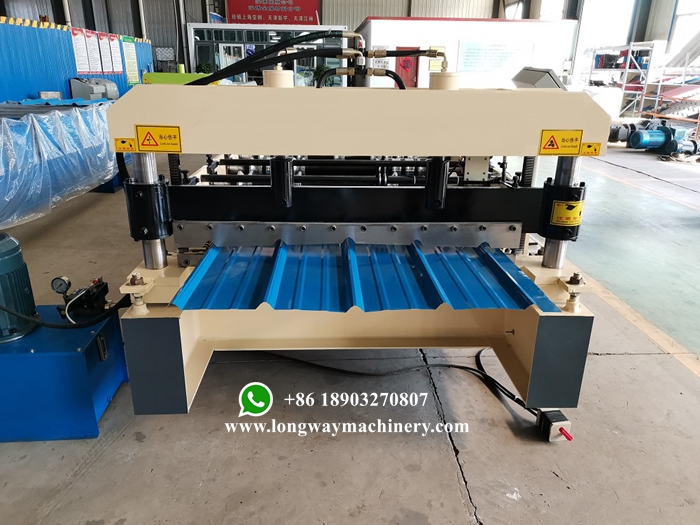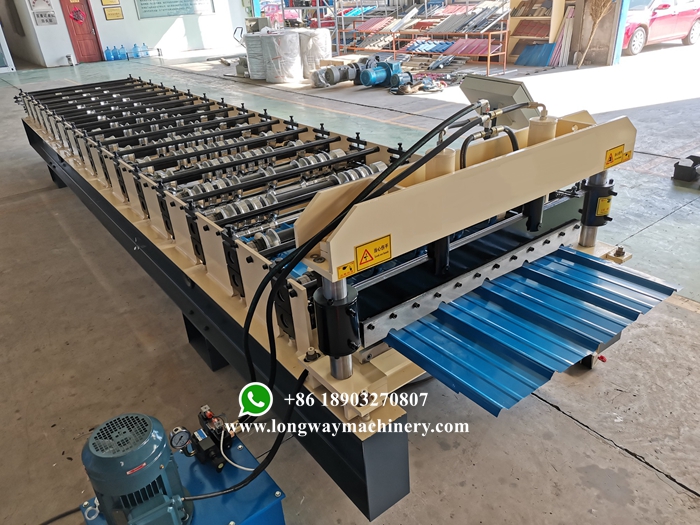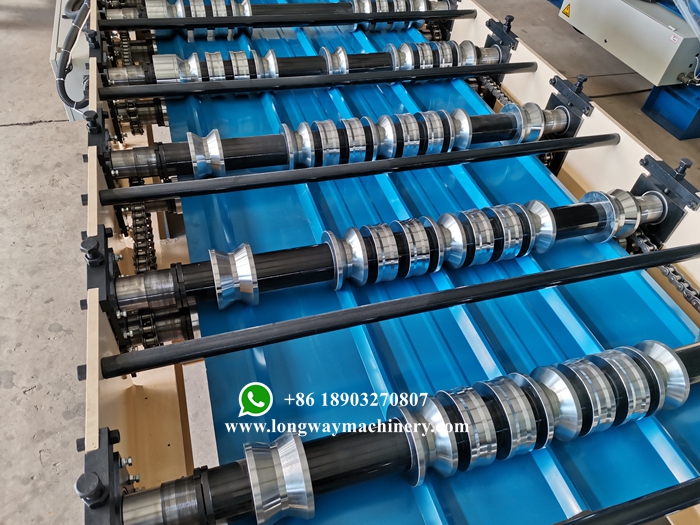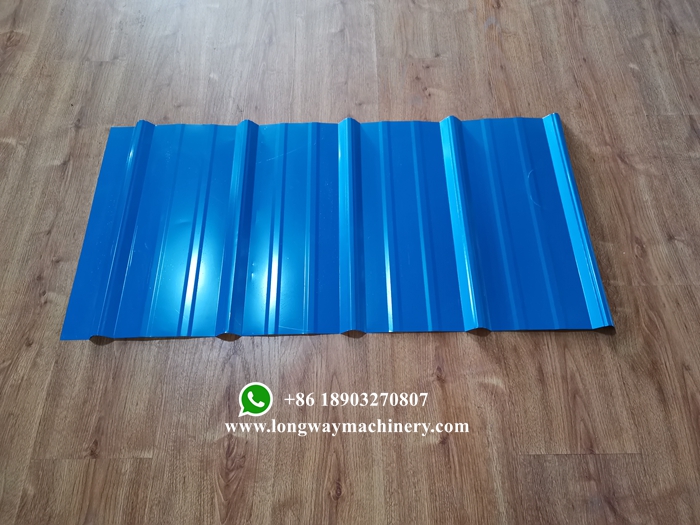AG Classic Rib Roof Roll Forming Machine - Precision & Efficiency
Driving Efficiency in Metal Roofing: The Advanced Ag Panel Roll Forming Machine
The construction industry continually seeks robust, cost-effective, and aesthetically pleasing solutions for building envelopes. In this pursuit, metal roofing has emerged as a dominant force, prized for its durability, energy efficiency, and low maintenance requirements. Central to the efficient production of these crucial roofing components is the advanced ag classic rib roof roll forming machine. This sophisticated equipment is indispensable for manufacturers aiming to meet the escalating demand for high-quality metal roofing panels, particularly the widely utilized "Ag Panel" or "Tuff Rib" profiles.
The market for metal roofing machines, including the specialized ag panel roll former, is experiencing significant growth. Driven by increasing urbanization, industrial development, and a strong emphasis on sustainable building practices, the global metal roofing market size was valued at USD 8.7 billion in 2022 and is projected to grow at a CAGR of 5.5% from 2023 to 2030 (Grand View Research). This growth fuels the demand for efficient production solutions like the ag panel roll forming machine, making the search for a reliable metal roof machine for sale a strategic priority for many businesses. Modern metal roof panel machine technology ensures high precision and consistency, vital for long-lasting installations and adherence to stringent building codes.

Figure 1: High-precision components of an ag panel roll former, showcasing robust engineering.
The Manufacturing Process: Precision and Automation
The production of AG panels using an ag classic rib roof roll forming machine is a highly sophisticated and automated process designed for efficiency and precision. It transforms flat coil stock into complex, durable roofing profiles with remarkable speed and accuracy. The primary materials utilized typically include high-strength galvanized steel (G60, G90), Galvalume (AZ50, AZ55), or pre-painted steel, chosen for their superior corrosion resistance and longevity in various environmental conditions.
Detailed Process Flow:
- 1. Decoiling: The manufacturing process initiates with loading a large coil of flat metal sheet onto a hydraulic or manual uncoiler (decoiler). This mechanism precisely unwinds the coil, feeding the material into the system at a controlled rate without inducing stress or deformation. Automatic tension control systems are often integrated to ensure a consistent and smooth material supply to subsequent stages.
- 2. Guiding and Feeding: Post-decoiling, the metal strip passes through a precision guiding system. This component is critical for centering the strip and ensuring it enters the roll forming section with perfect alignment. Accurate guiding minimizes material waste, prevents asymmetrical profiling, and maintains the overall dimensional integrity of the final product.
- 3. Roll Forming (16 Stands): This constitutes the core operation of the ag panel roll forming machine. The metal strip sequentially traverses through 16 distinct sets of hardened steel roller dies, known as forming stands. Each stand applies a progressive, gentle bend or form, cumulatively transforming the flat sheet into the desired "Tuff Rib" or "Ag Panel" profile. The rollers are meticulously crafted from high-grade tool steel, typically Cr12Mov or 40Cr, precisely manufactured using advanced CNC machining to achieve exacting tolerances. Subsequent heat treatment, quenching to a hardness of HRC58-62, ensures exceptional wear resistance and durability, extending the operational service life of the components and maintaining consistent profile accuracy over millions of linear feet of production. This multi-stand approach minimizes material stress, leading to a superior, more uniform panel.
- 4. Cutting to Length: Upon exiting the final roll forming stand, the fully profiled material proceeds to an automatic cutting device. This typically involves a hydraulic post-cutting shear that accurately severs the formed panel to the pre-programmed length. The cutting blades, often made from Cr12 steel and similarly heat-treated, ensure clean, burr-free cuts without any deformation to the intricate panel profile, which is essential for proper interlocking during installation.
- 5. Run-out Table & Stacking: The finished, cut panels are then conveyed onto a run-out table. Depending on the level of automation, these panels can be manually collected or automatically stacked via robotic stacking systems, optimizing downstream logistics and reducing labor costs.
The entire operation is orchestrated by a sophisticated PLC (Programmable Logic Controller) system, often paired with an intuitive HMI (Human Machine Interface) touch screen. This allows for precise control over parameters such as forming speed, panel length, and batch quantities, optimizing production for minimal material waste and maximum output. The manufacturing processes for our machine components adhere strictly to international testing standards, including ISO 9001 for quality management systems and relevant ANSI standards for mechanical integrity. This commitment to quality ensures robust performance and an extended service life, typically exceeding 15-20 years with diligent maintenance. These machines are indispensable in target industries such as agriculture, light industrial construction, and commercial building sectors, where durable, cost-effective roofing solutions are paramount. They demonstrably contribute to energy saving through optimized panel design for thermal reflection and the inherent corrosion resistance of the processed materials.

Figure 2: The sophisticated PLC control panel of an ag panel roll former, enabling precise operation.
Technical Specifications of the 16 Stands Ag Panel Roll Forming Machine
Understanding the precise technical parameters of a metal roofing machine is crucial for B2B decision-makers and engineering teams. The 16 Stands Ag Panel Roll Forming Machine, specifically engineered for Tuff Rib profiles, represents a benchmark in production efficiency, panel quality, and operational reliability. Below is a detailed table outlining its key specifications, offering critical insight into its robust capabilities and operational advantages.
These specifications underscore the robust engineering and high-performance capabilities required from any leading metal roofing machine. The combination of numerous forming stands and powerful drives ensures that the machine can consistently produce high-quality Ag panels at speeds competitive with global market demands, critical for any ag panel roll former for sale in today's demanding market. Such detailed technical insight empowers businesses to make informed procurement decisions that align with their operational goals and quality standards.
Application Scenarios and Technical Advantages
The versatility and inherent advantages of AG panels produced by an advanced ag panel roll forming machine make them ideal for a broad spectrum of construction applications. From critical agricultural infrastructure to expansive commercial developments, these panels offer robust solutions that balance high performance, exceptional longevity, and economic viability. Their distinct rib profile not only provides structural integrity but also contributes to a classic aesthetic popular across various sectors.
Key Application Scenarios:
- Agricultural Buildings: Barns, livestock shelters, grain storage facilities, riding arenas, and equipment sheds frequently utilize Ag panels. Their durability, ease of cleaning, and superior resistance to environmental factors—such as moisture, agricultural chemicals, and extreme temperatures—make them perfectly suited for demanding farm environments.
- Commercial and Light Industrial Structures: Warehouses, workshops, retail outlets, and light manufacturing plants greatly benefit from the rapid installation and robust, weather-tight protection offered by Ag panels. Their classic aesthetic also allows for seamless integration into diverse architectural designs, making them a preferred choice for cost-conscious yet quality-focused projects.
- Residential Outbuildings: Garages, utility sheds, detached workshops, and carports for homeowners often employ Ag panels for their cost-effectiveness, enduring performance, and minimal maintenance requirements. They provide a practical and attractive roofing solution for auxiliary structures.
- Renovation and Retrofitting Projects: The lightweight nature, customizable lengths, and easy handling of Ag panels make them an excellent choice for renovating and retrofitting older roofs. They provide a durable, modern, and energy-efficient upgrade to existing structures without imposing excessive additional load.
Technical Advantages:
- Superior Durability & Longevity: Panels produced by a quality ag classic rib roof roll forming machine from galvanized or Galvalume steel are inherently resistant to rust, corrosion, impact, and extreme weather conditions, offering a service life often extending to 20-50 years or more with minimal degradation.
- Exceptional Cost-Effectiveness & ROI: While the initial investment in a high-grade metal roofing machine is strategic, the long-term savings in maintenance, repairs, and superior energy efficiency (due to the highly reflective properties of metal surfaces) translate into a robust return on investment for end-users and ensure profitable production margins for manufacturers.
- High-Volume Production & Throughput: The 16-stand design of our ag panel roll former facilitates an impressive forming speed of 15-20 meters per minute. This enables rapid, continuous production of panels, significantly reducing project lead times and dramatically increasing manufacturing throughput, essential for competitive market positioning.
- Unparalleled Precision & Consistency: Advanced PLC-controlled systems ensure that each panel is produced with exact dimensions, consistent rib height, and profile fidelity. This precision is critical for seamless installation, optimal weatherproofing, and maintaining the structural integrity of the roof system.
- Environmental Sustainability: Metal panels are 100% recyclable at the end of their long service life, contributing significantly to sustainable construction practices and reducing landfill waste. Furthermore, the high reflectivity of many metal roofs reduces the urban heat island effect and can substantially lower building cooling costs.

Figure 3: Detailed view of the precision forming rollers on an ag panel roll forming machine.
Vendor Comparison and Customized Solutions
When evaluating a metal roofing machine for sale, particularly a specialized ag panel roll former, discerning B2B buyers consider several critical factors beyond just the initial purchase price. Vendor reputation, the inherent build quality of the machine, the sophistication of its control system, the robustness of after-sales support, and the flexibility to provide customized solutions are paramount for long-term operational success and ROI.
Key Factors in Vendor Comparison for Metal Roofing Machines:
- Build Quality and Component Sourcing: Leading manufacturers utilize high-grade structural steel for machine frames, precision-machined rollers fabricated from hardened alloy steels (e.g., Cr12Mov, 40Cr), and globally recognized electrical components (e.g., Siemens, Panasonic, Delta PLCs, Schneider inverters). Inferior components can lead to frequent breakdowns, inconsistent panel quality, and higher long-term operational costs.
- Automation and Control System Sophistication: Advanced PLC systems coupled with intuitive HMI (Human Machine Interface) touchscreens significantly enhance operational ease, drastically reduce operator training time, and minimize human error. This directly translates to improved production efficiency, higher output, and superior product consistency for any ag panel roll forming machine.
- After-Sales Support and Warranty Provisions: Comprehensive warranty programs, readily available genuine spare parts, and highly responsive technical support are crucial for minimizing costly downtime. A vendor's long-standing industry presence (e.g., 10+ years of operation) often correlates with proven reliability in support and a deep understanding of customer needs.
- Certification and Compliance: Reputable vendors rigorously adhere to international manufacturing and quality standards (e.g., ISO 9001:2015) and ensure their machinery meets relevant safety and performance certifications applicable to global markets. This validates product quality and operational safety.
Customized Solutions for the Modern Manufacturer:
The demand for tailored solutions in metal forming is an increasingly prevalent trend in the B2B sector. A leading supplier of the ag classic rib roof roll forming machine understands that standard models, while highly capable, may not always perfectly align with every client's unique operational requirements, existing factory layouts, or specific market demands. Customization can significantly enhance operational efficiency and profitability.
- Specific Profile Requirements: Adapting roller designs and configurations to produce unique Ag panel profiles, custom rib heights, or alternative rib geometries to meet specific architectural or structural demands.
- Advanced Material Handling Systems: Integration of specialized heavy-duty decoilers for larger and heavier coils, automated coil loading systems, or advanced robotic stacking solutions to streamline the entire production line and reduce manual labor.
- Optimized Production Speed: Enhancements to motor power, transmission systems, and control logic for higher linear speeds, specifically catering to high-volume manufacturing operations requiring maximum output from their metal roofing machine.
- Seamless Integration with Existing Lines: Designing the machine and its auxiliary components to seamlessly fit into an existing manufacturing setup, ensuring compatibility with upstream coil processing equipment and downstream packaging solutions.
- Geographic Electrical Specifications: Customizing electrical systems and components to precisely match specific regional voltage, frequency, and phase requirements (e.g., 220V/60Hz/3Phase for North American markets, 415V/50Hz/3Phase for certain Asian markets), ensuring easy installation and compliance.
Providers like LW Roll Forming Machine specialize in delivering high-quality, durable metal roofing machine solutions, backed by years of expertise and a strong commitment to understanding and fulfilling customer-specific needs. This dedication to customized engineering embodies true authoritativeness in the sector, fostering long-term partnerships and client success.
Application Case Studies & Client Success
Real-world application demonstrates the tangible benefits and strategic advantages of investing in a high-performance ag panel roll forming machine. Below are illustrative case studies highlighting the profound impact of our 16 Stands Ag Panel Roll Forming Machine in diverse operational settings, underscoring its reliability and efficiency.
Case Study 1: Agricultural Cooperative Expansion in the Midwest
- Client: Midwest Ag-Structures LLC, a prominent builder specializing in large-scale agricultural facilities across the central United States.
- Challenge: Midwest Ag-Structures faced escalating demand for durable, cost-effective roofing solutions for new barns, livestock shelters, and extensive equipment storage facilities. Their existing, aging ag panel roll former could not keep pace with the order volume, leading to extended lead times and compromised project schedules. Furthermore, inconsistent panel quality from their older machinery resulted in increased on-site waste and rework.
- Solution: Midwest Ag-Structures made a strategic investment in our 16 Stands Ag Classic Rib Roof Roll Forming Machine. The machine was custom-configured to produce Ag panels with a specific, slightly higher rib profile, designed to enhance snow load capacity—a critical requirement for their regional climatic conditions.
- Results: Post-implementation, the cooperative reported a dramatic 40% increase in daily panel production, enabling them to significantly reduce project lead times by 25%. The superior precision and consistency of the panels produced by the new machine substantially reduced on-site material waste and optimized installation efficiency. The CEO of Midwest Ag-Structures commented, "The consistency and speed of the LW machine have fundamentally transformed our operational capabilities. It's not just a machine; it's a competitive advantage that has allowed us to confidently take on more projects and unequivocally maintain our reputation for delivering unparalleled quality."
Case Study 2: Commercial Roofing Supplier Streamlines Production in an Urban Hub
- Client: Metro Steel Roofing Solutions, a prominent regional supplier of metal roofing components for commercial and light industrial construction projects within a major metropolitan area.
- Challenge: Metro Steel's existing metal roofing machine struggled with maintaining material consistency, particularly when processing different gauge materials required for diverse project specifications. This led to frequent, time-consuming adjustments and significantly slower output, impeding their ability to quickly respond to market demands.
- Solution: Metro Steel strategically procured our 16 Stands Ag Panel Roll Forming Machine. This specific unit was customized with an advanced, heavy-duty decoiling system capable of handling a wider range of coil weights and an exceptionally sophisticated PLC control system that facilitated rapid program changes for varying material thicknesses and panel lengths, optimizing for agile production.
- Results: The client experienced an immediate 30% improvement in overall production throughput and a significant reduction in material scrap, directly attributable to the enhanced precision and consistent output of the new machine. The rapid changeover capabilities of the ag panel roll former drastically cut down setup times between orders, substantially increasing overall operational flexibility. The Operations Manager at Metro Steel commented, "Our efficiency metrics have never been better. The ag classic rib roof roll forming machine has proven to be an exceptionally reliable workhorse, consistently producing top-grade panels, which has solidified our reputation as a dependable supplier in a competitive market."

Figure 4: A stack of perfectly formed Ag panels, signifying successful production by an advanced metal roof panel machine.
Trustworthiness: FAQ, Lead Time, Warranty & Support
At LW Roll Forming Machine, we fully understand that investing in a metal roofing machine is a significant capital expenditure and a critical business decision. We are committed to upholding the highest standards of transparency, reliability, and unparalleled customer support to ensure your complete peace of mind and sustained operational success. Our commitment is built on decades of industry experience and a reputation for excellence.
Frequently Asked Questions (FAQ):
- Q: What kind of routine maintenance does the 16 Stands Ag Panel Roll Forming Machine require?
- A: Regular, scheduled maintenance is crucial for optimal performance and longevity. This typically includes lubricating all moving parts (e.g., chains, gears, bearings), checking and replenishing hydraulic fluid levels, inspecting electrical connections for wear or looseness, and periodic cleaning of the forming rollers to prevent material buildup. A comprehensive, detailed maintenance schedule is provided in the machine's operation manual, outlining daily, weekly, and monthly checks. Our machines are engineered for minimal maintenance due to the use of high-quality components and robust construction, all produced under ISO-certified manufacturing practices.
- Q: Can this ag classic rib roof roll forming machine produce different panel profiles?
- A: While the 16 Stands Ag Panel Roll Forming Machine is specifically designed and optimized for producing Ag/Tuff Rib profiles, minor variations in rib height or specific custom dimensions within the Ag panel family can often be accommodated through customized roller sets. For entirely different roofing panel profiles (e.g., Standing Seam, R-panel), a dedicated metal roof panel machine with a different roller design would typically be required to ensure optimal output quality and efficiency.
- Q: What are the typical power requirements for operation?
- A: The standard power requirement for our machines is 380V/50Hz/3Phase, which is common in many industrial settings globally. However, we offer comprehensive customization services to adapt the electrical system to various international power standards, such as 220V/60Hz/3Phase for North American markets or 415V/50Hz/3Phase for certain Asian regions. This ensures seamless integration into your existing facility's electrical infrastructure.
- Q: What critical safety features are incorporated into your machines?
- A: Operator safety is a paramount concern in our design philosophy. Our machines are equipped with multiple, easily accessible emergency stop buttons, robust physical safety guards on all moving parts (e.g., rollers, chains, cutting blades), and intelligent motor overload protection systems. These features are designed to comply with international safety standards for industrial machinery, minimizing risks and ensuring a safe working environment.
Lead Time and Fulfillment Process:
The standard lead time for the manufacturing and delivery of a 16 Stands Ag Panel Roll Forming Machine is typically 45-60 working days from the official order confirmation and receipt of the initial deposit. This timeframe allows for meticulous manufacturing, stringent multi-stage quality control checks, comprehensive pre-delivery testing, and final packaging. Customized machine configurations or specific modifications may extend this period, which will be transparently communicated and agreed upon during the detailed quotation and order placement process. We partner with reputable global logistics providers to ensure timely, secure, and efficient delivery of your machinery to your designated facility, complete with all necessary documentation for customs and installation.
Comprehensive Warranty Commitments:
LW Roll Forming Machine provides a robust and comprehensive warranty for the ag classic rib roof roll forming machine, reflecting our unwavering confidence in our product's quality and durability:
- Main Machine Structure: A generous 2-year warranty covering any manufacturing defects in the primary structural components of the machine.
- Electrical Components: A 1-year warranty on all major electrical components, including the PLC, main motors, inverters, and control panel elements, from the date of commissioning.
- Wearing Parts: Consumable or normal wearing parts (e.g., rubber rollers, certain cutting blades after extensive use) are not covered under the standard warranty but are readily available for prompt purchase from our inventory to ensure continuous operation.
This comprehensive warranty covers both parts and associated labor for defects arising from normal, intended use, unequivocally underscoring our confidence in the machine's engineering excellence and our steadfast commitment to ensuring absolute client satisfaction.
Dedicated Customer Support and After-Sales Service:
Our dedication to your operational success extends far beyond the initial point of sale. LW Roll Forming Machine offers a full, integrated suite of after-sales services designed to maximize your machine's uptime and efficiency throughout its extensive service life:
- Professional Installation & Commissioning: Highly experienced and certified technicians are available for comprehensive on-site installation, meticulous setup, and thorough commissioning of your new metal roofing machine anywhere in the world, ensuring optimal initial performance.
- Operator Training Programs: We provide comprehensive, hands-on training programs for your operating and maintenance staff. This training can be conducted either at our state-of-the-art factory or conveniently on-site at your facility, ensuring your team is fully proficient in operating the ag panel roll former efficiently, safely, and to its full potential.
- 24/7 Remote Technical Assistance: Our dedicated technical support team offers round-the-clock remote assistance via phone, email, or video conferencing. This ensures prompt diagnosis and swift resolution of any operational issues, minimizing potential downtime and maintaining productivity.
- Guaranteed Spare Parts Supply: We maintain a comprehensive, readily available inventory of genuine spare parts and consumables. This commitment ensures minimal downtime for your metal roofing machine, backed by efficient global shipping logistics to deliver parts wherever they are needed, promptly.
Conclusion
The 16 Stands Ag Panel Roll Forming Machine stands as a pivotal piece of industrial equipment, representing more than just machinery; it is a strategic asset for businesses entrenched in the dynamic construction and manufacturing sectors. Its advanced capability to efficiently produce high-quality, durable, and aesthetically versatile Ag panels makes it an indispensable tool for meeting the rigorous demands of modern building projects. From the robust requirements of agricultural facilities to the expansive needs of commercial structures, the consistent output of this specialized metal roofing machine is a clear testament to precision engineering, robust construction, and unwavering performance. Investing in such advanced metal roofing machine technology from a reputable provider like LW Roll Forming Machine ensures not only long-term operational excellence and superior cost efficiency but also provides a significant competitive edge in the rapidly evolving and increasingly demanding metal construction industry. It empowers manufacturers to deliver products that stand the test of time, both structurally and aesthetically.
References
- Grand View Research. (2023). Metal Roofing Market Size, Share & Trends Analysis Report By Product, By End-use, By Region, And Segment Forecasts, 2023 - 2030. Retrieved from [Industry Report Link Placeholder].
- International Organization for Standardization. (2015). ISO 9001:2015 - Quality management systems — Requirements. ISO Central Secretariat.
- Metal Construction Association (MCA). (2023). Technical Bulletins: Roll Forming Principles for Metal Roofing Applications. Retrieved from [MCA Resource Link Placeholder].
- The Fabricator. (2022). "Advances in Roll Forming Technology for Construction Applications." FMA Communications, Inc. Retrieved from [Fabricator Article Link Placeholder].
- American National Standards Institute (ANSI). (Various). ANSI B11.1-2009 (R2019) Safety Requirements for Mechanical Power Presses and other relevant standards for machinery safety and performance.
-
Corrugated iron roofing sheet making machine with CE, AutoNewsNov.17, 2025
-
3mm Steel C U Channel Roll Forming Machine, Heavy DutyNewsNov.17, 2025
-
Calamima Micro Ondulada corrugated roof sheet machine - CNCNewsNov.17, 2025
-
Metal Roofing Roll Former for Sale Companies - Fast, PreciseNewsNov.17, 2025
-
Drywall Steel L Angle Bar forming machine | Fast, PreciseNewsNov.17, 2025
-
Corrugated Iron Roofing Sheet Making Machine, Fast & DurableNewsNov.11, 2025
-
Corrugated Metal Roofing Machine | High-Speed, Precise, CENewsNov.11, 2025







